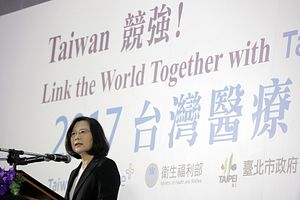Taiwan’s Tsai administration scored a victory for the “New Southbound Policy” this week, as Taiwan and the Philippines inked an updated investment deal in Makati, the Philippines’ financial hub. Under President Tsai Ing-wen, Taiwan is pursuing closer links with South and Southeast Asia, in an attempt to hedge against overdependence on mainland China.
Taiwan’s representative to the Philippines, Gary Song-huann Lin, and his counterpart, Angelito Banayo, signed the deal on December 7, in a ceremony also attended by Taiwanese Vice Economics Minister Wang Mei-hua and the Philippine Trade Undersecretary Ceferino Rodolfo. According to Taiwan’s CNA, the agreement “puts in place mechanisms that make investments more transparent and the treatment of investors fairer, including provisions on how investors can seek government assistance when they run into trouble.”
Another CNA report indicated that the agreement would expand the scope of bilateral investment, including the financial sector, infrastructure, and intellectual property. The previous version of the Philippines-Taiwan investment deal, which entered force in 1992, only covered the manufacturing sector.
The two sides also signed six other deals as part of ministerial trade and economic consultations, held in Manila on December 6 and 7, including memoranda of understanding on “green” energy, insurance industry supervision, and professional training.
“We hope the achievement with the Philippines will inspire other Southeast Asian countries to renew their investment agreements with Taiwan,” Wang told Taipei Times. Taiwan’s Ministry of Economic Affairs noted in a statement that Philippines could be an “important gateway” for Taiwan to expand into Association of Southeast Asian Nations (ASEAN) markets. In addition to the Philippines’ rapid economic growth and sizable market, the country is also the closet ASEAN member to Taiwan, the statement said.
The renewed investment agreement with the Philippines marks the first such deal successfully concluded under the New Southbound Policy, according to Taiwan’s Ministry of Economic Affairs. In the coming months, Taiwan hopes to sign updated or renewed versions of investment agreements with five more countries – India, Indonesia, Malaysia, Thailand, and Vietnam, all part of the New Southbound Policy’s area of focus.
The deal came despite Chinese pressure; according to Taiwan News, “China’s government filed a protest to the Philippines to try and convince it to abort the agreement at the last minute.” On December 8, the day after the deal was signed, China’s foreign ministry expressed “grave concern” over the new Taiwan-Philippine agreements.
Spokesperson Geng Shuang told reporters that “China sees no objection to a country that has diplomatic ties with China conducting normal economic, trade and people-to-people exchanges with Taiwan, but does firmly oppose … any form of official engagement or signing any agreement or cooperation document with sovereign implication.”
“[T]he investment protection agreement and other cooperation documents … are obviously official in character … We hope the Philippines will abide by the one-China principle and avoid having the Taiwan-related issue undermine the larger picture of China-Philippines relations,” Geng said, noting that China had “lodged representations” with the Philippines.
Under President Rodrigo Duterte, the Philippines has actively pursued closer relations with China. That effort apparently does not extend to sacrificing a traditionally robust trade relationship with Taiwan; now the question is whether China will seek to punish Manila for its decision.

































